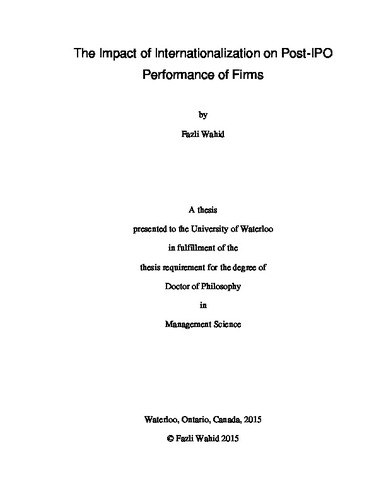| dc.description.abstract | This study examines the relationship between the degree of internationalization at the time of IPO (initial public offering) and post-IPO market performance of US and Canadian firms. This proposition derives its support from the synthesis of major theories of international business with signaling and information asymmetry theory. Theories of international business are developed from the perspectives of the behaviour and decision-making of managers of the firms, whereas signaling and information asymmetry theory are about communicating to external investors; and thereby incorporates the assessments of these investors. After the IPO, investors become substantial equity holders in the firms. Therefore, the integration of the two streams of theories will help us understand how investors evaluate the degree of internationalization at the time of IPO. The basic premise of this integration is that theories of internationalization have identified a number of benefits of international expansion of firms. In this research, I assume that these benefits of international expansion provide positive signals to potential investors. As signaling is related to information asymmetry, these positive signals reduce the information asymmetry of investors, inducing them to value firms with the most internationalization.
Further, drawing support from international new venture theory and the resource-based view (RBV) of the firm, this study explores the premise that international new ventures (INVs) go public earlier than other traditional firms. Rapid growth through international expansion requires substantial financial resources. One way to raise capital for this rapid international expansion is to go public earlier. As the speed of internationalization and early IPO might send strong positive signals to external investors, INVs would go public earlier.
Data on post-IPO returns, volatility of returns, underpricing, and other characteristics of the firm, including the scale and scope of international sales, was extracted from a number of secondary sources including different databases and company prospectuses. The sample is restricted to IPO firms in the manufacturing and service sectors, headquartered in the US and Canada, that issued initial public offerings from 2001 to 2011.
Post-IPO performance was measured in three ways: compound holding period returns, relative volatility of returns, and underpricing. The three measures of post-IPO performance are used to capture different aspects of performance, including the value assessed by external investors and insiders, and risk diversification.
Internationalization-performance relationships have been extensively evaluated using linear models. However, recent studies have found non-linear forms of the relationship. This study provides a theoretical rationale and evaluates the relationship between internationalization and post-IPO performance using both linear and non-linear models. Internationalization is a complex phenomenon and may not be appropriately evaluated using simple linear models. Therefore, this study assumes a U-shaped relationship between the degree of internationalization and compound holding period returns and an inverted U-shaped relationship between the degree of internationalization and relative volatility of returns and underpricing. Using least square regression, the results confirm the existence of non-linear relationships between internationalization and compound holding period returns and relative volatility of returns.
I find support for the idea that higher geographic scope provides a positive signal to potential investors. My findings indicate that higher geographic scope at the time of an IPO not only results in higher post-IPO returns, but also reduces the relative volatility of returns and underpricing. In the case of underpricing, higher intensity also leads to lower underpricing. The present study identifies an optimal point beyond which internationalization has a positive impact on performance. The implication is that management could signal future performance through both higher geographic scope and higher intensity of internationalization. In a similar way, investors can make more informed decisions using these signals. In contrast, at lower levels, internationalization is not related to compound holding period returns and underpricing, but it is positively associated with relative volatility. This implies that investors perceive lower levels of internationalization as more risky compared to higher levels.
The findings have implications for both investors and management. Investors can utilize the findings of higher geographic scope resulting in a desirable outcome of higher returns and lower risk to make decisions that are more informed. The results also provide a strong strategic message to management considering going public of the potential benefits of higher internationalization.
Contributions to the literature include: synthesizing theories of internationalization with signaling and information asymmetry theories, testing the non-linearity of the internationalization-performance relationship in the IPO context, evaluating the risk diversification aspect of multinationality in the context of IPO, and addition to the limited research on the link between internationalization and post-IPO performance. As simple linear and curvilinear approaches may not reveal the complexity of internationalization-performance relationship, this study introduces a dummy category approach in order to examine the relationship from different angles such as the impact of high and low internationalization, separating the effects of domestic firms, and identification of a threshold. | en |

